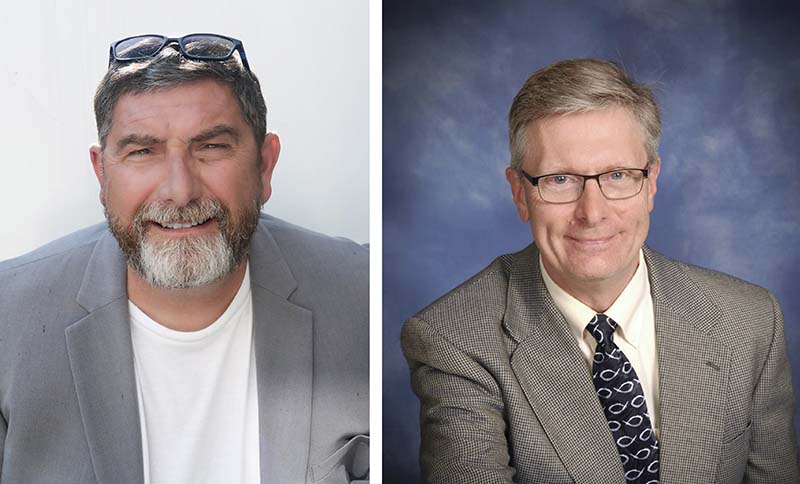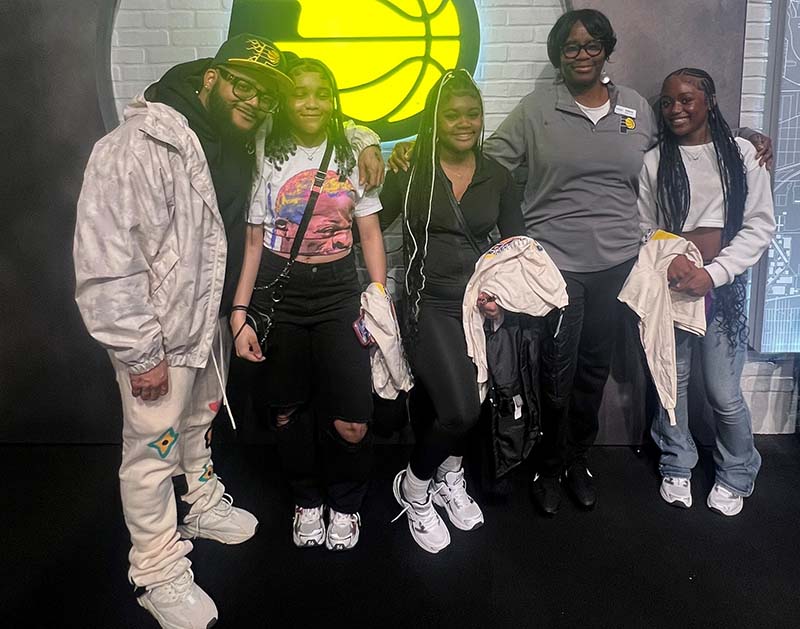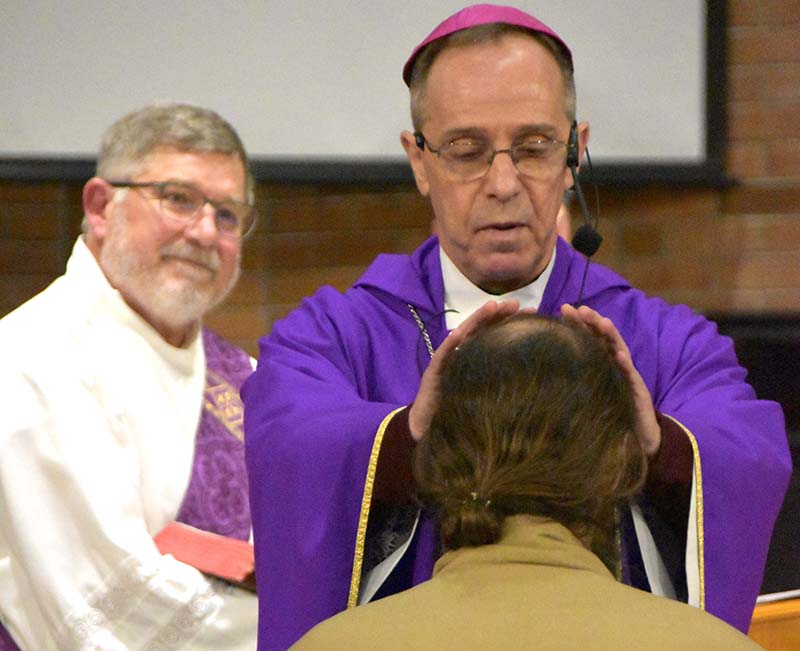(OSV News) — Scrolling through his phone, Jamarson Fitzgerald shares shots of a good life: smiling with his three daughters, posing while on the job, a photo of a newspaper clipping from years ago when he made the Indianapolis All-City Boys High School Basketball Team.
But life has not always been good for Fitzgerald. From the time he was a teenager until recently, he was in and out of prison for selling guns and drugs.
“Coming home to the same environment … it’s easy to get back in that life” that leads to incarceration, he said.
Finding a job a challenge
“One time I was released early,” he recalled.”I didn’t have any other clothes or shoes, no ID or Social Security card or birth certificate,” which made finding a job a challenge. He started selling guns and drugs again and was soon back in prison.
Another time, Fitzgerald received mental health counseling while incarcerated.
“It was helpful, but I didn’t have any way to continue it after I got out, and my mindset changed,” he told The Criterion, newspaper of the Archdiocese of Indianapolis.
What if Fitzgerald had a mentor to meet with six months before release? Someone to help him start getting things in place for his reentry — safe housing, reinstating a driver’s license, counseling, employment and connecting him with a church community?
Mentor to provide advice, encouragement
And what if that mentor stayed by his side? Picked him up the day he was released, continued working with him on resolving challenges and providing advice and encouragement?
“That would have been a blessing,” Fitzgerald admitted.”If you can see success … that can give you hope.”
The Archdiocese of Indianapolis is launching a revolutionary program — Catholic Charities-Prison Re-entry — to provide such help and hope.
“The best we can tell, this is the first time (a program like) this has been done in the United States,” said Deacon John Cord, archdiocesan coordinator of Catholic Charities-Corrections Ministries.
Principles of Catholic social teaching
The new reentry program”is rooted in the principles of Catholic social teaching, especially the dignity of the human person and solidarity,” said Archbishop Charles C. Thompson.” Just as Jesus turned to the so-called good thief on the cross and assured him of paradise, so we must never lose sight of the inherent dignity of every human being.”
That inherent dignity has been the focus of the archdiocesan Corrections Ministries — formerly part of the Department of Pastoral Ministries — since it was established under then-Indianapolis Archbishop Joseph W. Tobin in 2016.
He envisioned three areas in the ministry, said Deacon Cord: social justice, promoting legislative action and education; in-prison ministry; and reentry.
The first two areas have seen progress, he said. But reentry”had never been touched” when he became coordinator of Corrections Ministries in January 2023.
Archbishop’s clear directive
Deacon Cord recalled the clear directive Archbishop Thompson gave him.
“He said, ‘Look, we have to do all three (areas). We can’t do just what we’re doing.’ And he said, ‘Go for it.'”
First on the to-do list was identifying issues and challenges often faced by those re-entering society.
The person might need help overcoming drug or alcohol addiction. There might be problems with physical or mental health, financial issues or legal matters to address.
‘Fighting a really uphill battle’
For instance, when Chris Stimac was released from incarceration,”I was fighting a really uphill battle to stay connected to my children,” he recalled. “I got deeply involved in family courts, and that had huge financial consequences.”
Even having assistance reinstating a driver’s license would be helpful, said Derek Rehwinkel, who is currently in Tippecanoe Community Corrections in Lafayette, Indiana.
“Then you don’t have to worry about driving without a license,” he said.”And a lot of companies want people to have a driver’s license so they can rely on them to get to work. Or construction jobs — you have to have a license to drive to different sites.”
As Fitzgerald noted, finding safe housing and a job that pays enough for independent living are other major reentry issues.
Those reentering society
Finally, said Deacon Cord, those reentering society often “don’t have any good life direction. So, mentoring and connecting them with a church family and social families outside of the little circle that they have” is important.
For two years, Deacon Cord and his team researched Catholic and non-Catholic reentry programs throughout the country that worked to resolve these issues.
“We determined that we would like to do a very comprehensive reentry program,” he said.
The team then worked with the Indiana Department of Corrections, or IDOC, and other agencies to learn what was currently in place in central and southern Indiana to address reentry needs.
Four counties to launch program
Four counties — Bartholomew, Hendricks, Jackson and Shelby — were selected to initially launch the Catholic Charities-Prison Re-entry program on a small scale.

Each county “already had some of the services in place, so we weren’t reinventing the wheel,” said Deacon Cord.
The team met with each of those organizations to discuss their needs”so we can fill in the gaps,” he explained.”How can we make it so that a person coming out of prison only has one place they have to reach out to, and boom, they have everything they need and it’s done, and these folks are put on a path to recovery?”
The process will begin with trained mentors meeting with a person six months prior to their release, with help from IDOC in vetting for those”who are very focused on making a better life for themselves,” Deacon Cord explained.
Working with person prior to reentry
The IDOC doesn’t normally allow organizations to work with a person prior to reentry, said David Liebel, the department’s director of religious services and community engagement.
“But knowing the preparation that’s gone into this (new reentry program),” he said,”we’re comfortable to make that accommodation in this case.
“Trust is a difficult thing to build. So, allowing volunteers with the ministry to make contact and begin work prior to release and then follow through with them post-release I think is going to be crucial.”
The mentor will pick up the person the day of their release and drive them to transitional housing.
Help with handling various issues
Next comes addressing health, addictions, counseling, legal, financial and other needs. In each county, a team of experts in those areas will be created for the mentors to approach for help in handling the person’s various issues.
“And then we’ll work to find them a good job with a salary they can live on,” said Deacon Cord.
Once the person is stabilized, he adds,”we’ll find them permanent housing — good, stable, safe housing — that they can afford.
“And then the mentors will stay with them if they want … just to kind of be there as a friend and sounding board.”
Knowing someone cares
Such a program would be “monumental … if nothing else from the emotional point of view that someone cares,” said Stimac, who now works as vice president of research and impact for John Boner Neighborhood Centers in Indianapolis.
Stimac notes a misconception that”the minute the (prison) gate closes behind them, there’s relief.
“But it’s the opposite. For many, that’s the worst moment because there’s no safety net. Many prefer to go back in.”
The archdiocese’s reentry program “would change the whole paradigm. Knowing you’ve got someone to walk with you, to know that mentor is invested in you even before you walk out the door will relieve the amount of anxiety.”

Deacon Cord said the current plan is to hire a director for the Catholic Charities-Prison Re-entry program soon, then start working with the IDOC by the end of the year to select people who will be released from certain facilities in the four trial counties.
Eventually will expand to 39 counties
Eventually, the program will expand into all 39 counties that comprise the archdiocese. Deacon Cord and his team also created vision plans for other services the program could include”five, 10, 20 years from now.”
Given the increase in resources the new reentry program will require, Corrections Ministries is now an outreach of the archdiocese’s Catholic Charities secretariat.
“Corrections ministry is a vital expression of our mission: to extend compassion, dignity and spiritual support to those impacted by incarceration … and walk with them toward restoration and renewal,” said archdiocesan Catholic Charities executive director David Bethuram.
Lives of those affected by incarceration
He is especially excited for the opportunity to “reach deeper into the lives of those affected by incarceration — men and women who have often endured profound trauma.”
Archbishop Thompson is clear that”no excuse can justify violence toward another person.
“But the church has long advocated for the administration of justice tempered with the sweetness of mercy,” he adds. “It is our hope and confidence that the new re-entry ministry will prove beneficial to those individuals who are seeking to start afresh, as well as (to) their families and society itself. … Jesus reminds us that what we do to the least of his brothers or sisters, we do to him.”
Natalie Hoefer is a staff writer at The Criterion, newspaper of the Archdiocese of Indianapolis. This story was originally published by The Criterion and distributed through a partnership with OSV News.




